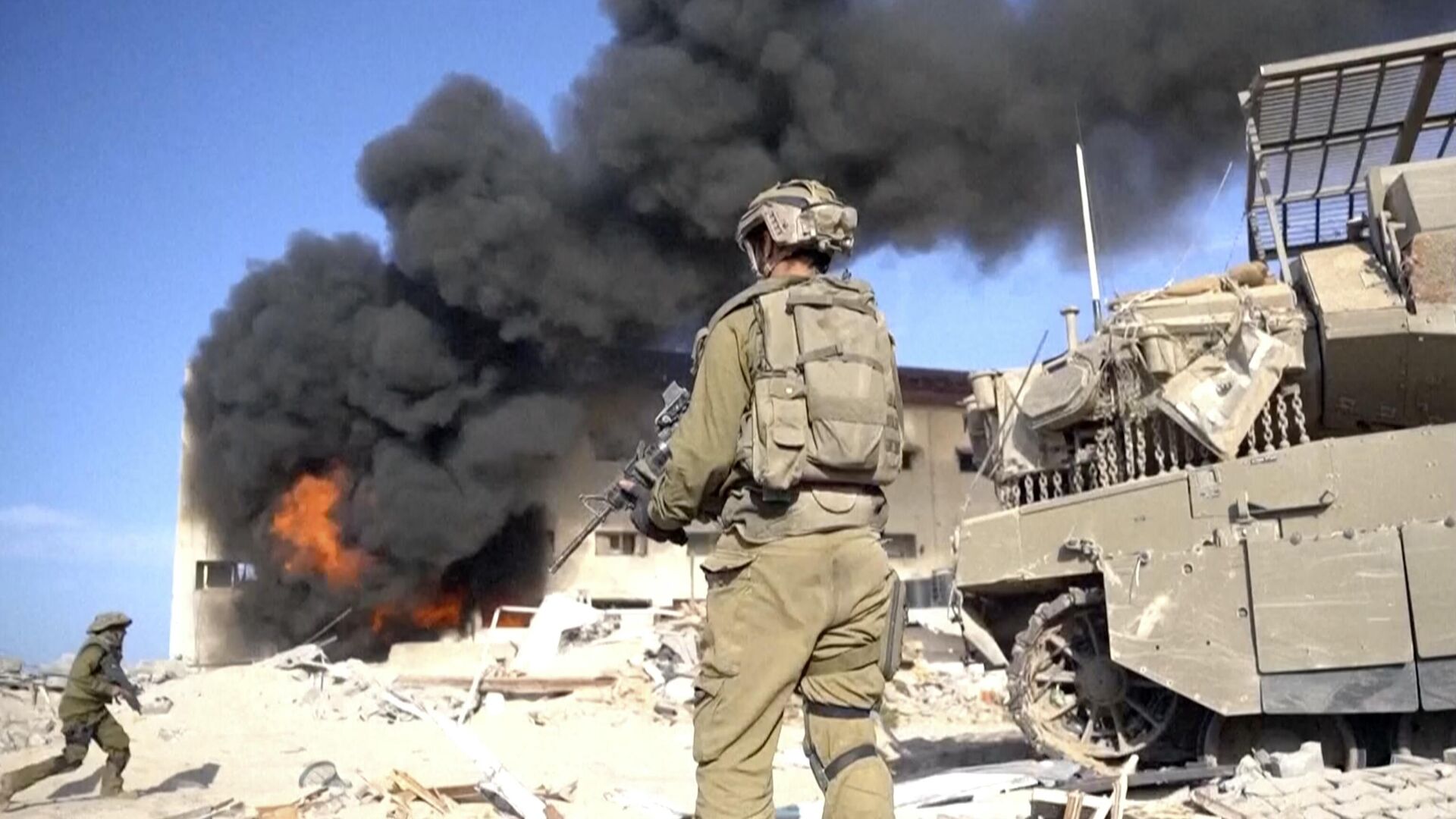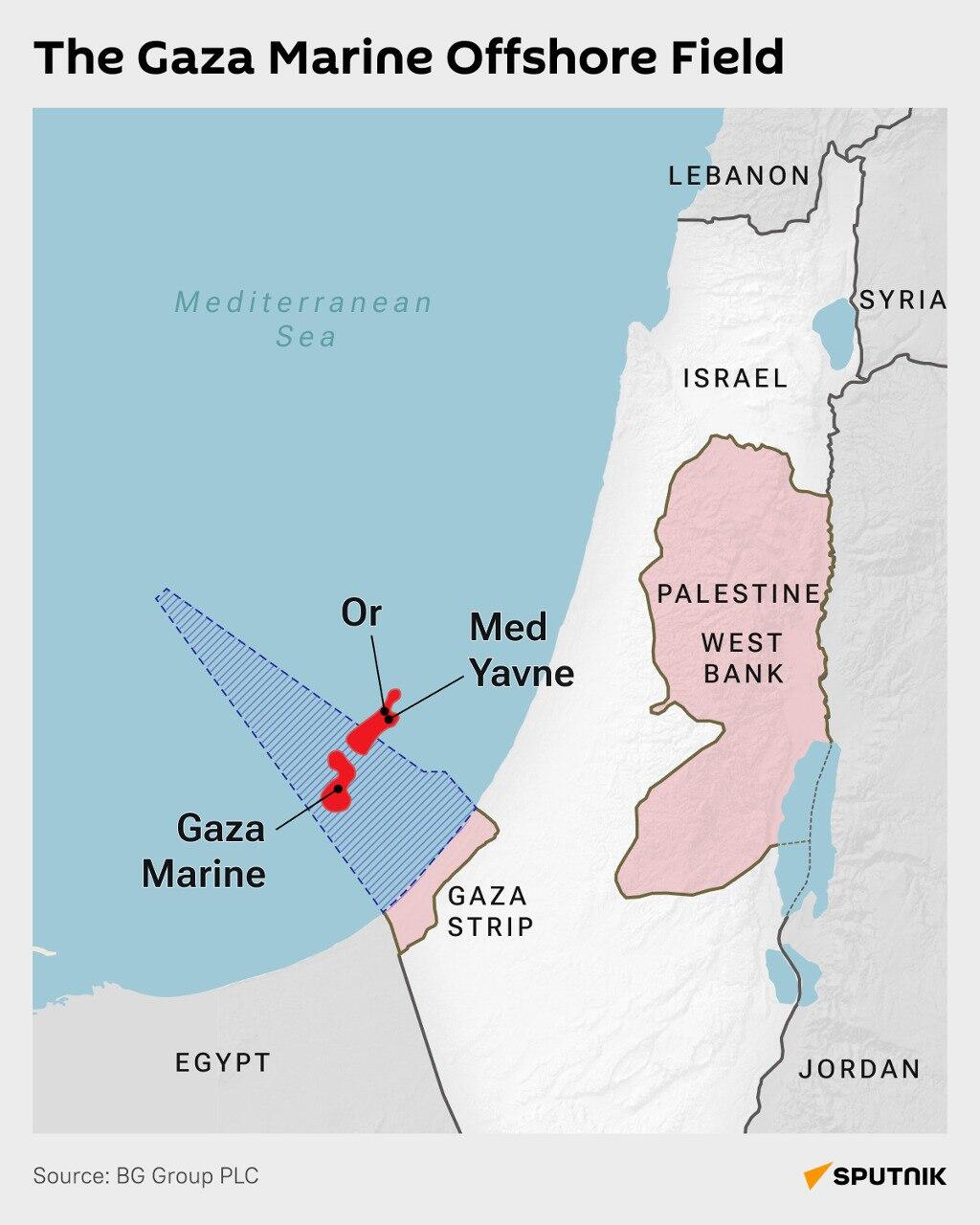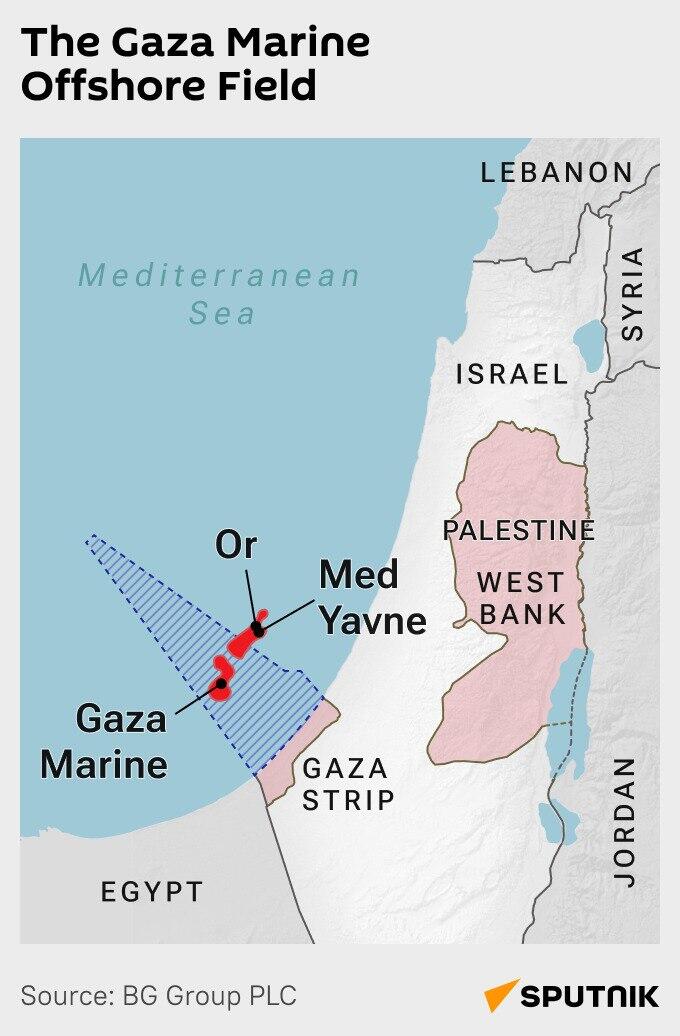https://sputnikglobe.com/20231117/gaza-marine-is-israel-palestine-conflict-caused-by-offshore-gas-interests-1115031157.html
Gaza Marine: Is Israel-Palestine Conflict Caused by Offshore Gas Interests?
Gaza Marine: Is Israel-Palestine Conflict Caused by Offshore Gas Interests?
Sputnik International
The Gaza Strip boasts offshore natural gas deposits located 36 km off its coast. Does Tel Aviv's declared determination to control the area after the war have anything to do with the Palestinian energy trove?
2023-11-17T19:33+0000
2023-11-17T19:33+0000
2024-01-30T10:27+0000
us
world
dr mamdouh salameh
benjamin netanyahu
konstantin simonov
israel
gaza strip
palestinian authority
hamas
leviathan
https://cdn1.img.sputnikglobe.com/img/07e7/0b/11/1115013958_0:0:3072:1728_1920x0_80_0_0_46a9614c91baf1296b0435e94235ab0c.jpg
Israel continues to make progress on the ground in the Gaza Strip. Prime Minister Benjamin Netanyahu has repeatedly said that Tel Aviv is going to maintain control over the strip until it is demilitarized and de-radicalized. Netanyahu also appears to defy the Biden administration's signal that if the Israel Defense Forces (IDF) manage to defeat Hamas, Israel should allow the Palestinian Authority to take the reins of the strip.However, some observers believe that it's not actually demilitarization of the Gaza Strip that lies behind Tel Aviv's desire to supervise the region, but an untapped gas field named Gaza Marine.What is Gaza Marine?Gaza Marine is a natural gas field located 36 kilometers (22 mi) off the coast of the Gaza Strip at a depth of 610 meters. It is estimated to hold 32 billion cubic meters of natural gas and is complemented by a smaller field containing roughly three billion cubic meters of gas near Palestinian and Israeli territorial waters.However, the project was mired in controversies since the very beginning. Per US sociologist and author Michael Herman Schwartz, Tel Aviv insisted at that time that Israel should control PA's profits from gas, so that they were not used "for terror." "With this, the Oslo Accords were officially doomed," the author wrote.Meanwhile, in September 2000, famous Palestinian leader Yasser Arafat lauded Gaza Marine as "a gift from God" to the Palestinians and claimed that it would "provide a solid foundation for our economy, for establishing an independent state with holy Jerusalem as its capital." Arafat's statement came at the time of the beginning of the Second Intifada, which erupted after the failed Camp David Summit between US President Bill Clinton, Israeli Prime Minister Ehud Barak and the PA chairman.Israeli-Palestinian hostilities lasted for roughly five years, being stopped by the Sharm el-Sheikh Summit of 2005 which saw new PA leader Mahmoud Abbas and Israeli Prime Minister Ariel Sharon taking decisive steps for de-escalation.In the subsequent years, the Gaza Strip saw the withdrawal of the Israeli military forces in 2005, the rise of Hamas' political wing and the expulsion of PA's Fatah from the strip in 2007. In response to Hamas' takeover, Egypt and Israel exerted a blockade of the strip that devastated its economy.In the course of all those years, Gaza Marine had remained untapped and undeveloped with Tel Aviv preventing the exploration under the pretext that the natural gas wealth would be used by Hamas and other Palestinian insurgent groups in their fight against Israel.Western Corps Lost PatienceStalled negotiations with the Israeli government, the Gaza Strip's takeover by Hamas and the Gaza war of 2008 resulted in BG shutting down its office in Tel Aviv. BG continued to hold its stake in the field's exploration but did not express much interest in it.Several years later, in 2015, the Palestinian government resumed talks with BG to abrogate the exclusive rights it had given to the company. Following the negotiations, the Palestinian side, presented by the Palestinian Investment Fund (PIF), got 17.5% stake in the gas field rights; Consolidated Contractors Company (CCC) held 27.5%.On April 8, 2016, Shell acquired BG, ending up with a 55% stake in the field. It appears that Shell did not consider the project promising, so it relinquished its stake in 2018, transferring it to Palestinian officials thus forcing them to find a new international contractor.To push ahead with the project, the PIF took 27.5% of the stake, the CCC retained the same share, and 45% was left for an operating company to start the long-anticipated exploration and extraction. In February 2021, the PIF and CCC signed an agreement with the Egyptian Natural Gas Holding Company (EGAS) to develop the Gaza Marine field off the shores of the Gaza Strip. The project aimed to contribute "to strengthening Palestinian national independence," said the February 2021 memorandum of understanding (MOU) inked by the parties.In late November 2022, the Washington Post alleged that the Palestinian Authority, Egypt, Israel and Hamas may kick off the $1.4 billion gas exploration project in Gaza Marine, adding that it was due to be finalized by February 2023, while gas production could start as early as in March 2024.In May 2023, another publication, the Arab News, reported that the Benjamin Netanyahu government was conducting secret gas talks with the Palestinian Authority under the auspices of the US. In June, Israel officially gave preliminary approval for the development of a gas field off the Gaza Strip, stressing, however, that it would require security coordination with the Palestinian Authority and neighboring Egypt.Why Israel-Hamas War Wasn't Caused by GasIt's highly unlikely that the ongoing Israel-Hamas war in the Gaza Strip could be provoked by gas interests, said Dr. Mamdouh G. Salameh, an international oil economist and global energy expert.Indeed, presently Israel has 11 sizable gas fields, including Tamar, with the biggest, Leviathan, having an estimated 623 billion cubic meters of gas. Given that, Gaza Marine, lying in the Gaza Strip's proximity, doesn't make much difference for Tel Aviv's energy interests.Meanwhile, the already discovered fields off the strip's shores – even though they are not as huge as those claimed by Israel – are still big enough to sustain Gaza's and the Palestinian territories' economies, according to the expert.Actually, the stakes are much higher, according to Salameh. He argued that "the Palestinian occupied territories might have a share in the future from the Eastern Mediterranean gas reserves estimated at 3.45 trillion cubic meters and 1.7 billion barrels of oil."Konstantin Simonov, general director of the National Energy Security Fund, shared Salameh's stance that the present conflict wasn't provoked by an Israel-Palestinian energy dispute."A popular conspiracy theory is that all this started because there are colossal hydrocarbon reserves there," Simonov told Sputnik. "Firstly, the [Middle Eastern] region naturally triggers the concept that all events there should be viewed through the prism of hydrocarbons (…) But I think that here, after all, hydrocarbons are not of primary and fundamental importance."Per Simonov, BG did not proceed with Gaza Marine exploration mostly because the profits from the troublesome deposits weren't sizeable enough.The Russian scholar doubts that Palestinians would be able to claim rights for other gas fields found by Israel off the coast in the foreseeable future. Israel and its Western partners are racing against the clock to explore and extract hydrocarbons from the Tamar, Leviathan, and Aphrodite fields and it is highly unlikely that they would allow the Palestinian Authority to raise the issue of demarcating the Eastern Mediterranean shelf areas.In any event, not being rooted in the energy dispute, the ongoing Gaza war has once again thrown a wrench in the Palestinian Authority's much-needed gas project which could have helped restore the Palestinian economy and contribute to building a two-state solution.
https://sputnikglobe.com/20231117/us-doubles-down-on-claim-that-hamas-used-al-shifa-hospital-as-command-post-1115022154.html
https://sputnikglobe.com/20231114/what-are-hamas-survival-odds-as-israeli-military-gains-ground-in-gaza-city-1114957823.html
https://sputnikglobe.com/20231117/sponge-bomb-no-pants-can-novel-israeli-weapon-thwart-hamas-tunnel-warfare-1115026641.html
https://sputnikglobe.com/20231116/moscow-calls-substitution-of-concepts-bidens-remark-on-need-to-create-palestinian-state-1114995436.html
https://sputnikglobe.com/20231115/iran-and-lebanon-have-no-desire-to-be-embroiled-in-palestine-israel-conflict---lavrov-1114972830.html
israel
gaza strip
palestine
Sputnik International
feedback@sputniknews.com
+74956456601
MIA „Rosiya Segodnya“
2023
News
en_EN
Sputnik International
feedback@sputniknews.com
+74956456601
MIA „Rosiya Segodnya“
Sputnik International
feedback@sputniknews.com
+74956456601
MIA „Rosiya Segodnya“
gaza marine, israel, israel-hamas war, gaza strip, gaza war, natural gas, oil, offshore gas, offshore oil, british gas, palestinian authority, hamas, egypt, shell, stakes in gas exploration, palestinian economy, palestinian state, palestinian natural gas
gaza marine, israel, israel-hamas war, gaza strip, gaza war, natural gas, oil, offshore gas, offshore oil, british gas, palestinian authority, hamas, egypt, shell, stakes in gas exploration, palestinian economy, palestinian state, palestinian natural gas
Gaza Marine: Is Israel-Palestine Conflict Caused by Offshore Gas Interests?
19:33 GMT 17.11.2023 (Updated: 10:27 GMT 30.01.2024) The Gaza Strip boasts offshore natural gas deposits located 36 km off its coast. Does Tel Aviv's declared determination to control the area after the war have anything to do with the Palestinian energy trove?
Israel continues to make progress on the ground in the Gaza Strip. Prime Minister Benjamin Netanyahu has repeatedly said that Tel Aviv is going to maintain control over the strip until it is demilitarized and de-radicalized. Netanyahu also appears to defy the Biden administration's signal that if the Israel Defense Forces (IDF)
manage to defeat Hamas, Israel should allow the Palestinian Authority to take the reins of the strip.
However, some observers believe that it's not actually demilitarization of the Gaza Strip that lies behind Tel Aviv's desire to supervise the region, but an untapped gas field named Gaza Marine.
Gaza Marine is a natural gas field located 36 kilometers (22 mi) off the coast of the Gaza Strip at a depth of 610 meters. It is estimated to hold 32 billion cubic meters of natural gas and is complemented by a smaller field containing roughly three billion cubic meters of gas near Palestinian and Israeli territorial waters.
The field was discovered by British Gas (BG) in 1999 after the energy consortium was granted a 25-year license for the Gaza maritime territory by the Palestinian Authority (PA). This license provided the company not only with exploratory rights but also gave the right to develop any discovered fields and install necessary infrastructure. While BG took a 90% stake in the license, the other 10% was bought by the Consolidated Contractors Company (CCC), a Mideast construction giant.
However, the project was mired in controversies since the very beginning. Per US sociologist and author Michael Herman Schwartz, Tel Aviv insisted at that time that Israel should control PA's profits from gas, so that they were not used "for terror." "With this, the Oslo Accords were officially doomed," the author wrote.
Meanwhile, in September 2000, famous Palestinian leader Yasser Arafat lauded Gaza Marine as "a gift from God" to the Palestinians and claimed that it would "provide a solid foundation for our economy, for establishing an independent state with holy Jerusalem as its capital." Arafat's statement came at the time of the beginning of the Second Intifada, which erupted after the failed Camp David Summit between US President Bill Clinton, Israeli Prime Minister Ehud Barak and the PA chairman.
Israeli-Palestinian hostilities lasted for roughly five years, being stopped by the Sharm el-Sheikh Summit of 2005 which saw new PA leader Mahmoud Abbas and Israeli Prime Minister Ariel Sharon taking decisive steps for de-escalation.
In the subsequent years, the Gaza Strip saw the withdrawal of the Israeli military forces in 2005, the rise of Hamas' political wing and the expulsion of PA's Fatah from the strip in 2007. In response to Hamas' takeover, Egypt and Israel exerted a blockade of the strip that devastated its economy.
In December 2008, a new conflict rocked the strip, known as Operation Cast Lead or the Gaza Massacre, between Israel Defense Forces (IDF) and Hamas. Hostilities ended on January 18, 2009. However, Israel-Hamas clashes continued since then. All in all, since 2005, Hamas and Israel have fought five wars, with the most recent starting in October.
In the course of all those years, Gaza Marine had remained untapped and undeveloped with Tel Aviv preventing the exploration under the pretext that the natural gas wealth would be used by
Hamas and other Palestinian insurgent groups in their fight against Israel.
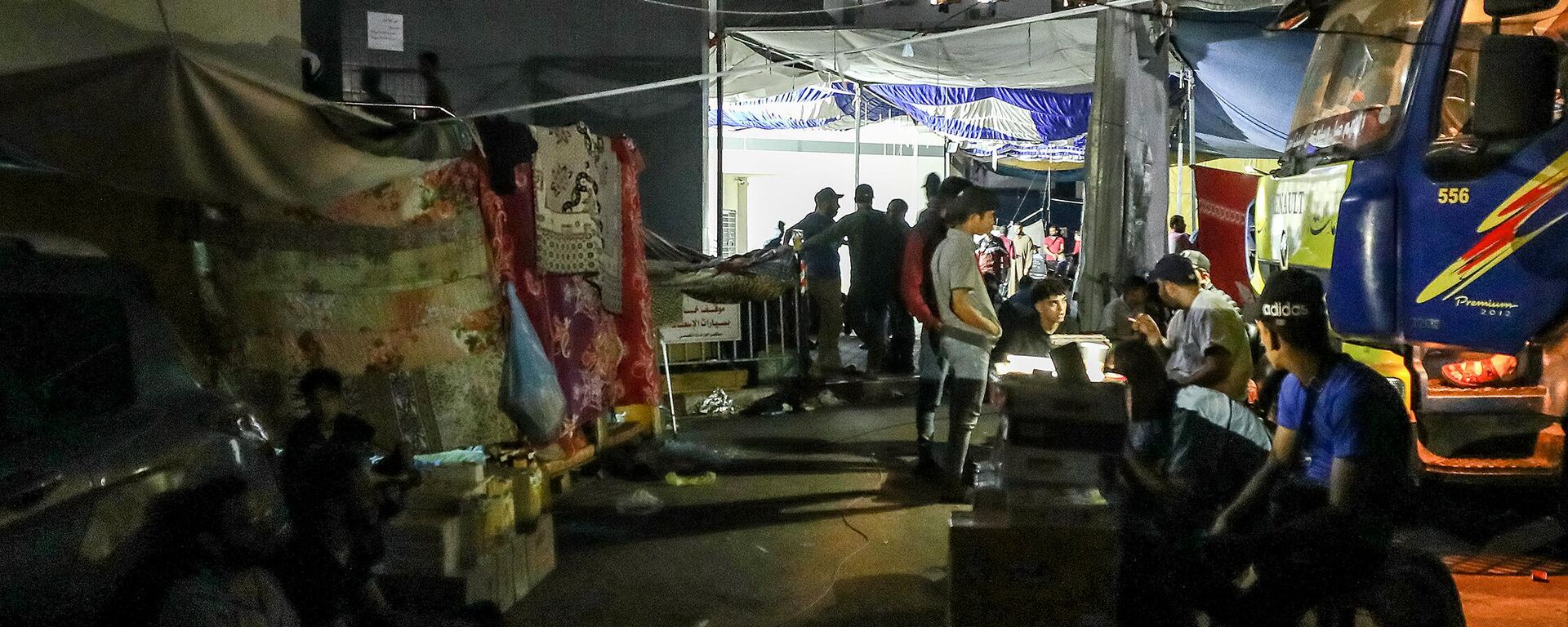
17 November 2023, 13:28 GMT
Western Corps Lost Patience
Stalled negotiations with the Israeli government, the Gaza Strip's takeover by Hamas and the Gaza war of 2008 resulted in BG shutting down its office in Tel Aviv. BG continued to hold its stake in the field's exploration but did not express much interest in it.
Several years later, in 2015, the Palestinian government resumed talks with BG to abrogate the exclusive rights it had given to the company. Following the negotiations, the Palestinian side, presented by the Palestinian Investment Fund (PIF), got 17.5% stake in the gas field rights; Consolidated Contractors Company (CCC) held 27.5%.
On April 8, 2016, Shell acquired BG, ending up with a 55% stake in the field. It appears that Shell did not consider the project promising, so it relinquished its stake in 2018, transferring it to Palestinian officials thus forcing them to find a new international contractor.
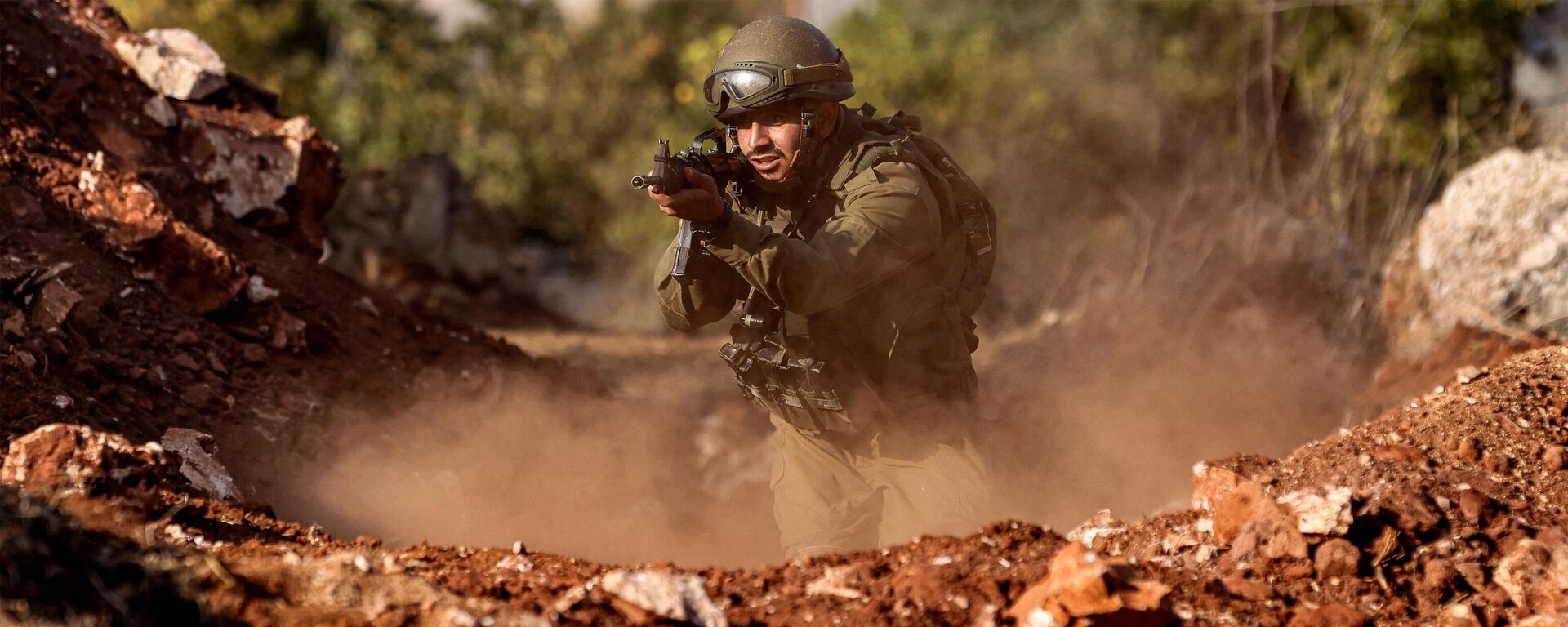
14 November 2023, 19:04 GMT
To push ahead with the project, the PIF took 27.5% of the stake, the CCC retained the same share, and 45% was left for an operating company to start the long-anticipated exploration and extraction. In February 2021, the PIF and CCC signed an agreement with the Egyptian Natural Gas Holding Company (EGAS) to develop the Gaza Marine field off the shores of the Gaza Strip. The project aimed to contribute "to strengthening Palestinian national independence," said the February 2021 memorandum of understanding (MOU) inked by the parties.
In late November 2022, the Washington Post alleged that the Palestinian Authority, Egypt, Israel and Hamas may kick off the $1.4 billion gas exploration project in Gaza Marine, adding that it was due to be finalized by February 2023, while gas production could start as early as in March 2024.
In May 2023, another publication, the Arab News, reported that the Benjamin Netanyahu government was conducting secret gas talks with the Palestinian Authority under the auspices of the US. In June, Israel officially gave preliminary approval for the development of a gas field off the Gaza Strip, stressing, however, that it would require security coordination with the Palestinian Authority and neighboring Egypt.
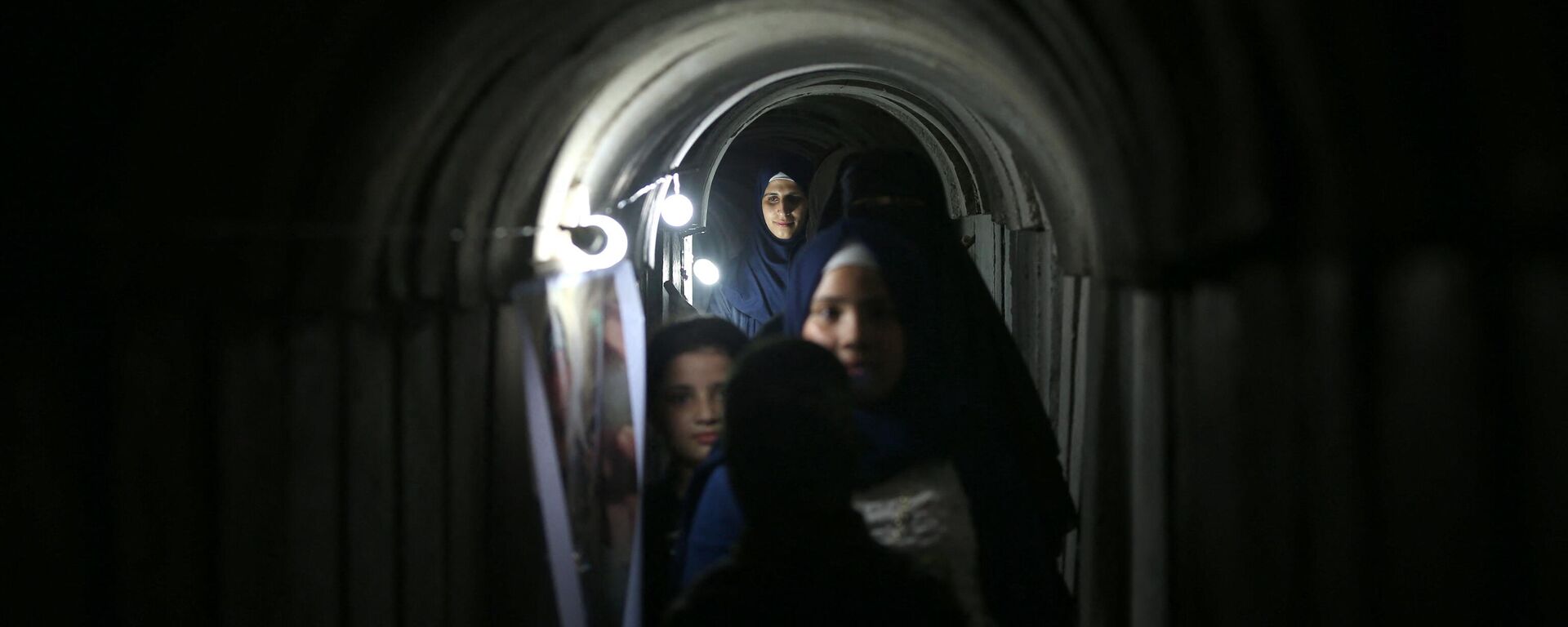
17 November 2023, 17:35 GMT
Why Israel-Hamas War Wasn't Caused by Gas
It's highly unlikely that the ongoing Israel-Hamas war in the Gaza Strip could be provoked by gas interests, said Dr. Mamdouh G. Salameh, an international oil economist and global energy expert.
"The recent Hamas-Israel conflict has its origins in Britain’s Balfour Declaration of establishing a native home for Jews in Palestine and displacing its original and lawful people from their native home," Salameh told Sputnik. "As far as I know, only gas reserves estimated at 35 billion cubic meters (bcm) have been discovered by British BG company offshore Gaza Strip."
Indeed, presently Israel has 11 sizable gas fields, including Tamar, with the biggest, Leviathan, having an estimated 623 billion cubic meters of gas. Given that, Gaza Marine, lying in the Gaza Strip's proximity, doesn't make much difference for Tel Aviv's energy interests.
Meanwhile, the already discovered fields off the strip's shores – even though they are not as huge as those claimed by Israel – are still big enough to sustain Gaza's and the Palestinian territories' economies, according to the expert.
"Were the Palestinian Authority to be permitted to explore for offshore oil and gas, it is very probable that it will discover sizable offshore gas and oil reserves like Egypt, Israel and Cyprus. The value of these reserves once proven could sustain an independent Palestinian economy for years," Salameh underscored.
Actually, the stakes are much higher, according to Salameh. He argued that "the Palestinian occupied territories might have a share in the future from the Eastern Mediterranean gas reserves estimated at 3.45 trillion cubic meters and 1.7 billion barrels of oil."

16 November 2023, 09:00 GMT
Konstantin Simonov, general director of the National Energy Security Fund, shared Salameh's stance that the present conflict wasn't provoked by an Israel-Palestinian energy dispute.
"A popular conspiracy theory is that all this started because there are colossal hydrocarbon reserves there," Simonov told Sputnik. "Firstly, the [Middle Eastern] region naturally triggers the concept that all events there should be viewed through the prism of hydrocarbons (…) But I think that here, after all, hydrocarbons are not of primary and fundamental importance."
Per Simonov, BG did not proceed with Gaza Marine exploration mostly because the profits from the troublesome deposits weren't sizeable enough.
"Even though BG did something there, it was actually not the largest discovery, not the largest deposit," the expert explained. "And that is why, in fact, they did not undertake any real development there. Now, I repeat, all the most interesting projects are located in that part of the Byzantine basin that Israel considers its own and is already developing."
The Russian scholar doubts that Palestinians would be able to claim rights for other gas fields found by Israel off the coast in the foreseeable future. Israel and its Western partners are racing against the clock to explore and extract hydrocarbons from the Tamar, Leviathan, and Aphrodite fields and it is highly unlikely that they would allow the Palestinian Authority to raise the issue of demarcating the Eastern Mediterranean shelf areas.
In any event, not being rooted in the energy dispute, the ongoing Gaza war has once again thrown a wrench in the Palestinian Authority's much-needed gas project which could have helped
restore the Palestinian economy and contribute to building a two-state solution.

15 November 2023, 10:25 GMT
